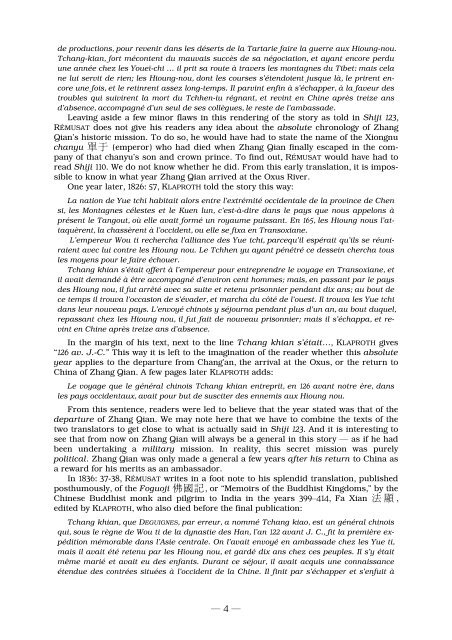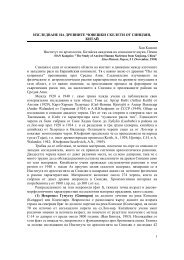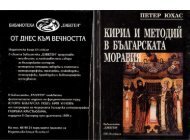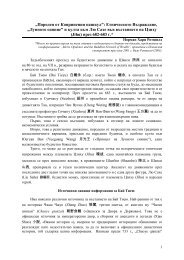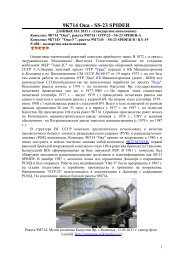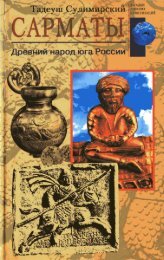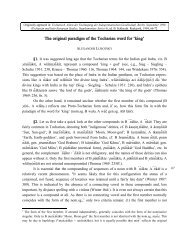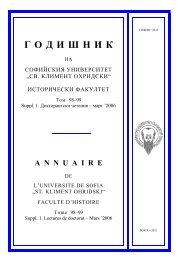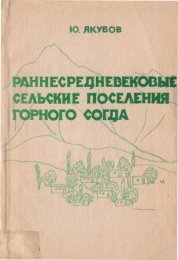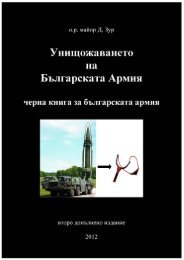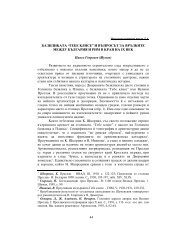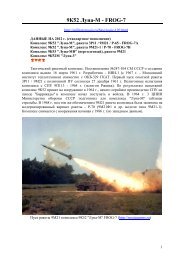You also want an ePaper? Increase the reach of your titles
YUMPU automatically turns print PDFs into web optimized ePapers that Google loves.
de productions, pour revenir dans les déserts de la Tartarie faire la guerre aux Hioung-nou.<br />
Tchang-kian, fort mécontent du mauvais succès de sa négociation, et ayant encore perdu<br />
une année chez les Youeï-chi … il prit sa route à travers les montagnes du Tibet: mais cela<br />
ne lui servit de rien; les Hioung-nou, dont les courses s’étendoient jusque là, le prirent encore<br />
une fois, et le retinrent assez long-temps. Il parvint enfin à s’échapper, à la faveur des<br />
troubles qui suivirent la mort du Tchhen-iu régnant, et revint en Chine après treize ans<br />
d’absence,<br />
accompagné d’un seul de ses collègues, le reste de l’ambassade.<br />
Leaving aside a few minor flaws in this rendering of the story as told in Shiji 123,<br />
RÉMUSAT does not give his readers any idea about the absolute chronology of Zhang<br />
Qian’s historic mission. To do so, he would have had to state the name of the Xiongnu<br />
chanyu 單于 (emperor) who had died when Zhang Qian finally escaped in the company<br />
of that<br />
chanyu’s son and crown prince. To find out, RÉMUSAT would have had to<br />
read<br />
Shiji 110. We do not know whether he did. From this early translation, it is impossible<br />
to know in what year Zhang Qian arrived at the Oxus River.<br />
One year later, 1826: 57, KLAPROTH told the story this way:<br />
La nation de Yue tchi habitait alors entre l’extrémité occidentale de la province de Chen<br />
si, les Montagnes célestes et le Kuen lun, c’est-à-dire dans le pays que nous appelons à<br />
présent le Tangout, où elle avait formé un royaume puissant. En 165, les Hioung nous l’attaquèrent,<br />
la chassèrent à l’occident, ou elle se fixa en Transoxiane.<br />
L’empereur Wou ti rechercha l’alliance des Yue tchi, parcequ’il espérait qu’ils se réuniraient<br />
avec lui contre les Hioung nou. Le Tchhen yu ayant pénétré ce dessein chercha tous<br />
les moyens pour le faire échouer.<br />
Tchang khian s’était offert à l’empereur pour entreprendre le voyage en Transoxiane, et<br />
il avait demandé à être accompagné d’environ cent hommes; mais, en passant par le pays<br />
des<br />
Hioung nou, il fut arrêté avec sa suite et retenu prisonnier pendant dix ans; au bout de<br />
ce temps il trouva l’occasion de s’évader, et marcha du côté de l’ouest. Il trouva les Yue tchi<br />
dans leur nouveau pays. L’envoyé chinois y séjourna pendant plus d’un an, au bout duquel,<br />
repassant chez les Hioung<br />
nou, il fut fait de nouveau prisonnier; mais il s’échappa, et revint<br />
en Chine après treize ans d’absence.<br />
In the margin of his text, next to the line Tchang khian s’était…, KLAPROTH gives<br />
“126 av. J.-C.” This way it is left to the imagination of the reader whether this absolute<br />
year<br />
applies to the departure from Chang’an, the arrival at the Oxus, or the return to<br />
China<br />
of Zhang Qian. A few pages later KLAPROTH adds:<br />
Le voyage que le général chinois Tchang khian entreprit, en 126 avant notre ère, dans<br />
les pays occidentaux, avait pour but de susciter des ennemis aux Hioung nou.<br />
From this sentence, readers were led to believe that the year stated was that of the<br />
departure of Zhang Qian. We may note here that we have to combine the texts of the<br />
two translators to get close to what is actually said in Shiji 123. And it is interesting to<br />
see that from now on Zhang Qian will always be a general in this story — as if he had<br />
been undertaking a military mission. In reality, this secret mission was purely<br />
political. Zhang Qian was only made a general a few years after his return to China as<br />
a reward<br />
for his merits as an ambassador.<br />
In 1836: 37-38, RÉMUSAT writes in a foot note to his splendid translation, published<br />
posthumously,<br />
of the Foguoji 佛國記, or “Memoirs of the Buddhist Kingdoms,” by the<br />
Chinese<br />
Buddhist monk and pilgrim to India in the years 399–414, Fa Xian 法顯,<br />
edited<br />
by KLAPROTH, who also died before the final publication:<br />
Tchang khian, que<br />
DEGUIGNES, par erreur, a nommé Tchang kiao, est un général chinois<br />
qui,<br />
sous le règne de Wou ti de la dynastie des Han, l’an 122 avant J. C., fit la première expédition<br />
mémorable dans l’Asie centrale. On l’avait envoyé en ambassade chez les Yue ti,<br />
mais il avait été retenu par les Hioung nou, et gardé dix ans chez ces peuples. Il s’y était<br />
même marié et avait eu des enfants. Durant ce séjour, il avait acquis une connaissance<br />
étendue des contrées situées à l’occident de la Chine. Il finit par s’échapper et s’enfuit à<br />
— 4 —


